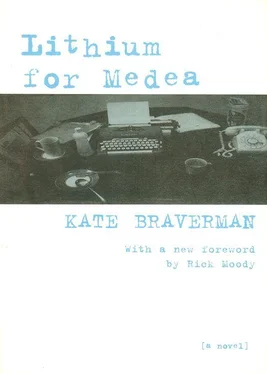Of course, you think I’m stupid. Because I didn’t get spoonfed at some college? I’m in MENSA. You know what that is? It’s a special society for geniuses. They verified my IQ at 168. Less than one percent of the population has an IQ that high.
No, the matrilineal inheritances also have a sustaining and positive aspect in the narrator’s letters to her institutionalized cousin, Rachel, all on the subject of their grandmother, the matriarch of the narrator’s clan. Like other great feminine irrealists, Leonora Carrington, Angela Carter, Rikki Ducornet, et al., Braverman’s surging voice and presence incline toward a goal, which is to supplant the linearity of the masculine and patriarchal with a far more complex alternative. However, like everything else in Lithium and the rest of Braverman’s work, this trajectory is intuitive, not labored, not polemical, and it comes first to the surface in the restless iteration of sentences. In form, that is, rather than in content, Everything was one long unbroken morphine afternoon, a dream without motion or direction.
The surrealists accomplished some of their revolution through the disturbance of the senses, and it’s fair to ask whether the narrator of Lithium is so knotted into the thick of her addiction that the book sometimes seems to be in it with her, rather than without. For me, however, this is the level on which Lithium for Medea is completely realistic. It doesn’t talk about cocaine or amphetamines at great length, but it enacts their arc, their longing, and the time after the high on nearly every page. Even when Lithium is silent on the subject, I can still hear the buzzing in the ears and feel the grinding teeth of a cocaine high. Every relationship here is colored by the influence of these intoxicants, and every aspect of every relationship. For me, this is a liberating experience, the true evocation of the scourge of addiction. So much of the writing in the eighties about cocaine and drug abuse managed to romanticize its effects. Lithium , while apparently written from the inside, never glamorizes, always terrorizes,
I lived in my special silence, my world within a world of cold white tiles and ice sheets, and thought, good God, won’t somebody please come and take this walking, breathing, stinking nightmare off my hands?
Why would a kid at twenty-six, working as a ghost in the machinery of a large publishing corporation get a crush on this book? Because, despite all its addictive behavior, despite its joyless sexual encounters, despite its family hatreds, despite its cancer and psychopathology, despite its anthropomorphism and linguistic hyperbole, it never lies about how it feels to be young. It never lies. By its example, Lithium for Medea cares about the young and their plight, sympathizes with this plight, gives good counsel on how to survive the lean years of youth, I will awaken, I will begin again. Once you have one of these experiences with a book, you are forever in its debt, because truth and perfect sympathy are rare qualities in the literary world. Therefore: it’s great to have Lithium for Medea around again, after a decade when it was about as easy to find as a white tiger. It’s good to have it around, because another generation of young women and men is growing up. To them and all good readers, I say take heart and use this pilgrimage as your reliable map.
RICK MOODY
October 2001
Everything requires an explanation: Name. Age. Sexual persuasion. Occupation. Incarnation. Marital status. Addictions. Past arrests (note convictions).
There was a sound.
Water.
I was running a bath. It was good to be liquid. I didn’t have skin at all. I had the gleam of a fish, the fine etched scales and gills. I knew the soft channel down. I could burrow into the blue weight. I could wear whitecaps embossed across my back, a kind of spine. I could eat anything and breathe under water.
My paraphernalia was neatly arranged on the floor. I had the cotton and alcohol ready. I had ground the cocaine into a fine white powder. My spoon was balanced on the bathtub ledge, next to my syringe, when the telephone rang.
“I have to talk to you.”
The voice was cold, sharp and precise. I tried to place it. Usually my mother will have her secretary call me. And of course Francine has so many voices, now plaintive and aloof, now cooing and abused. There’s her voice of exhaustion, throat raspy from too many cigarettes and too much coffee at the end of budget conferences. And there’s the whispery tone of caution she uses when she isn’t alone.
“What is it?” My heart jumped.
My life was a set of parallel worlds. Each world had distinct rules and personalities. The chemistry, mathematics and history were different. The basic elements, evolution and development were all as intricate and absolutely different as the life on a carbon-based world might differ from a world built on methane. My parallel worlds were wide and smooth and clearly marked. The atmospheres were mutually lethal. There could be no collision course.
“It’s your father,” Francine said. She let it sit there a long time. “He’s sick.” She paused again. “He’s going to the hospital in the morning.”
“Cancer?” I had been holding the syringe. I put the needle down.
“Bingo,” Francine said. “And bad.”
My wet feet touched the floor. I took the syringe apart and put it on the bottom of my purse. I had a feeling I was going to need it.
I drove east toward Beverly Hills and wound north off Sunset Boulevard. I was filled with something suffocating, painful and dry. The whole world looked as if it had been washed in white paint.
My mother’s house is very white. It is in the authentic Spanish tradition, built around an orange tiled courtyard. The house is nestled on the side of a hill, its long back red-brick terrace flush with the mountain. Francine bought the house the year she divorced my father.
“See what I’ve done?” she demanded.
It was the first time I had come to see her new house, to take the grand tour. Francine was wearing a peach-colored silk dressing gown. She rustled as she walked, now pausing, now pointing to each special feature in the house one by one. My mother has always had an enormous capacity and appreciation for details. She also has an excellent memory. I followed her silently through the thickly carpeted rooms.
“Notice the floor plan, the creative use of space. Only one bedroom.” Francine stared at me. The other bedrooms had been converted to a study, a sunroom and a wood-paneled room housing a pool table.
I understood. In her way, Francine was saying it wasn’t a family house. There wasn’t a family anymore. The only overnight guests Francine planned on would be sleeping in her bed.
“I did it all myself.” Her voice was rising higher, edging into her private danger zone.
Francine indicated the gently arched doorways, the rounded windows which a special crew would come and scrub once each week. I stared at the windows. They were large and sparkling clean. The air beyond was a pale undemanding blue.
“I did this all by myself. You know who’s lived here? Zsa Zsa Gabor. Elliot Gould. Howard Hughes used to keep his starlets here.” Francine grabbed my wrist. She put her face very close to mine. Her eyes were amber, enormous and fixed.
“Why do I tell you this? I want you to be proud of me.”
Francine pointed to the twenty-two-foot-high ceilings. She showed me the fireplace in the bedroom and the mirrors along the far wall. She pointed to the wood (“genuine redwood — I had it tested”) beams in the ceilings. She showed me the dining room with its three glass sides all looking down on the city.
Читать дальше












